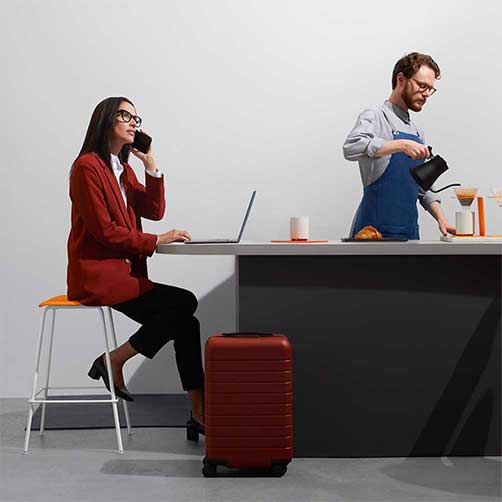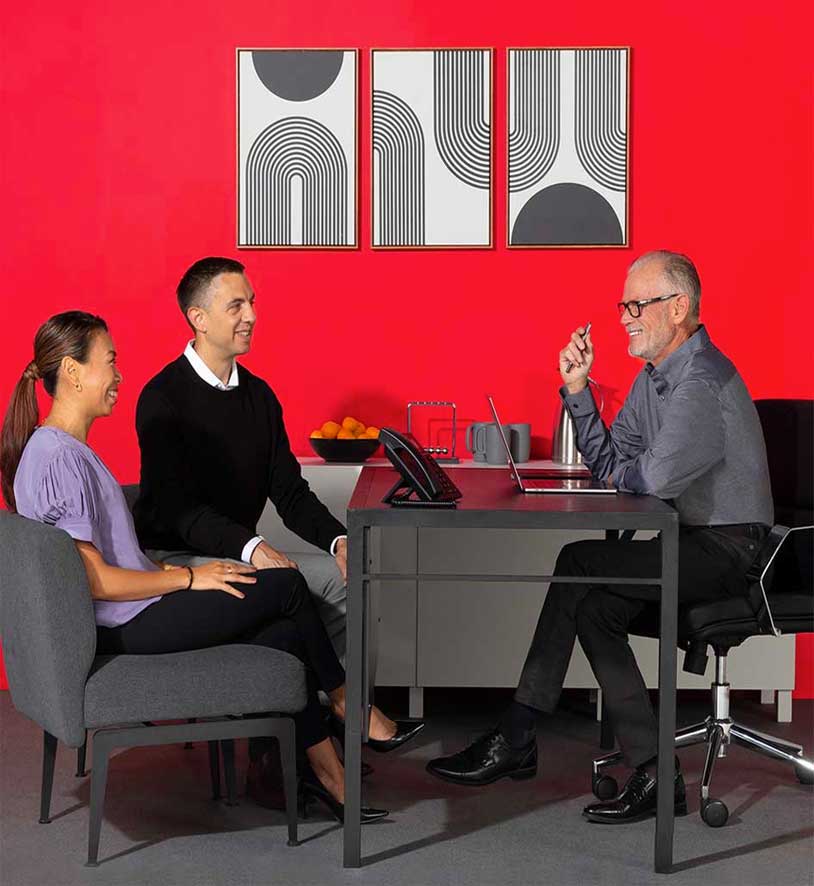Should you buy business softphones, desk phones or go hybrid?

If you’re looking to upgrade your existing small business phone system to an internet-based one, you’ll have to decide on how you want to make calls. Do you want to do a complete switch to business softphones, buy new desk phones or do both?
We know it can be a little overwhelming, change isn’t easy. So let’s take a look at what each phone type offers and which configuration best fits your business.
Can softphones do everything desk phones do?
Your first question might be, “What is a softphone?” Sometimes called a computer phone, it’s any software that allows you to make telephone calls on a computer, tablet or smartphone using the internet instead of a traditional copper wire connection. And, yes, softphones can offer everything desk phones do! Ultimately, the decision you’re going to make won’t have anything to do with basic calling features. Instead, it’s going to come down to user preferences and whether you can use phone software instead of phone hardware.
Here’s what it might look like
Your desktop and laptop computers (Mac or Windows) become business phones with the help of a desktop app. To make and receive calls, staff can use their computer’s built-in audio or connect a headset or headphones for better audio quality.
• But how would it work? Let’s look at hospitality businesses, such as hotels and motels. They handle large volumes of calls. Streamlined softphone features allow staff to route customer calls efficiently and accurately, which is essential for creating a professional impression.
You can also turn your iOS or Android devices into business softphones. You just download the app to your device, log in and then start making and receiving calls using your business number. Your personal number stays hidden. Even better, you’ll have flexibility. You can use your iPhone, Android smartphone or even an iPad!
• Here’s how it would work. In the real estate industry, agents are often out and about in the field hosting open houses, showing properties or looking at new ones. With a softphone on their smartphone, they can connect with new and existing clients any time, no matter where they are.
Ultimately, having access to a softphone app allows everyone in your business to work from anywhere, managing their calls anywhere on any device. It also eliminates the need to be tied to a desk and a desk phone either in the office or at home. Your employees won’t be left in the dark when they have to go into the field.
Bonus: Users will have access to phone features like call forwarding, making their interactions with colleagues and customers more professional and productive.
Should you buy new VoIP desk phones?
It depends! The good thing about VoIP systems is that it’s easy to plug in your existing or new internet-based desk phones and get to work, which is just one reason why VoIP is more cost effective compared to a landline or on-premises phone system.
However, the bigger consideration is the needs of you and your employees. Do your remote-working employees need physical desk phones for their work? Or are softphones more efficient for them?
Would the receptionist who handles high-call volume be fine with a softphone and a headset or do they need all the physical buttons that a desk phone provides?
Does the service department need cordless phones or mobile phones to carry from the work area to their desks?
These are the types of questions to ask yourself as you determine whether softphones, desk phones or a mix of both is best for your business. There are very few blanket answers here, since so much of communication depends on your role within the company.
Here are a couple challenges you should also think about if you go with business desk phones for everyone:
1. Phone delivery: If your remote workers need desk phones, you’ll need to ship the units to each at-home employee and guide them through the setup process.
2. Missed calls: Staff who are out of office and away from their desk phones run the risk of missing important calls.
If you only have desk phones with a traditional landline or on-premises system and you want your employees to stay connected while on the go, they would have to use their own smartphones. However, they’ll have to make and receive calls using their personal numbers. This can feel like infringing on their personal lives and can become a privacy issue.
Clean sweep to softphones or hybrid with desk phones?
The advancement of technology never stops, and that can make it difficult for small businesses to keep up with the latest innovations and upgrades.
If you, at some point, made a hefty up-front investment in phone hardware and the phones still work well, it’s understandable for you to be reluctant to abandon that model. Plus, some employees may need a desk phone’s physical features to get work done efficiently. That means desk phones are the logical choice.
Get a flexible phone system that will adapt to your business
As your business grows, your phone system will need to keep pace with additional employees and increased call volume, while also providing your customers with the best calling experience possible.
Therefore, the decision about which types of phones to buy can be challenging. To make that decision more manageable, you’ll find that a cloud-based phone system is more flexible to your needs—from adding softphone users to working with a hybrid model of VoIP desk phones and softphones. That’s where your service provider support team comes in. They can help you work through the pros and cons of each possible configuration. Don’t have a provider? Call (877) 621-0515 and an Ooma Office representative will be happy to help you.

Learn more about how Ooma Office can help your business.
Thank you!
An Ooma Office Sales Representative will be in touch shortly.
866-573-0707


Learn more about how Ooma Office can help your business.
Just call 877-621-0515 or click this to CHAT. Or, fill out this form and someone will reach out to you shortly.



